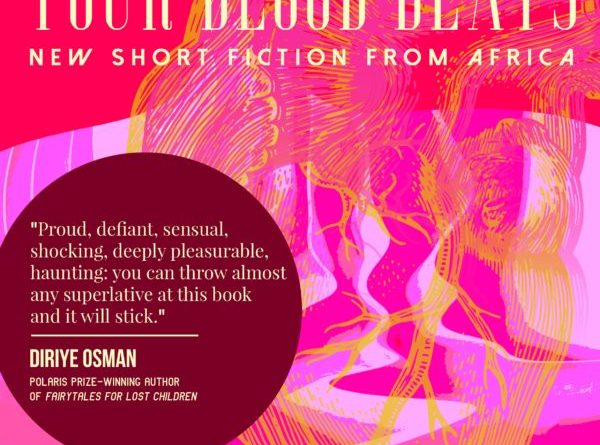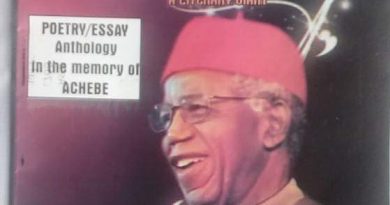Recommended Short Stories You Can Read Online. This Edition Features Stories by Klara Kalu, Innocent Acan Immaculate, and Edith Knight.
This week’s stories are beautiful and painful and funny; all three stories from Brittle Paper. Two from the anthologies they published this year—Go the Way Your Blood Beats, edited by Ananthi Jongilanga, and The Vanguard Book of Love Stories, edited by Nonso Anyanwu—and one from their blog.
I hope you enjoy them as much as I did.
“You Bury Me”, Klara Kalu (published in The Vanguard Book of Love Stories, edited by Nonso Anyanwu)
“Ife mi,
Do you remember the first time you saved me? I was ten years old and my mom had sent me to buy Maggi when that troublesome group of teenage boys in our neighborhood stopped me.”—from “You Bury Me”.
In this beautifully told story, childhood love grows as the characters, a boy and a girl, grow older. And it doesn’t end even when death did its thing.
Klara Kalu, whose works I’ll have to begin searching for now, and follow, is an amazing talent. She wrote this short story with much carefulness and a kind of freedom, too. I bet it could be a novel; she does well at building her characters and not leaving characters out. While the story is about the two lovers, we also meet other characters like Mr. Chikwem, the man who drove their primary school bus; the narrator’s mother; the lady the boy dated when he got to the Uni.
This is a short story that spans almost the lifetime of two people, yet there is a way in which we aren’t bored with the unnecessary; what we’re given is what the story needs. Things move smoothly and happen so fast, yet we don’t feel like something’s been skipped. This is what made me feel like, yes, I agree, when I got to the part where the narrator’s mother said, “I always knew it was him.”, after the narrator told her that they , the main characters, were getting married.
I can’t say exactly what the story will do for you, but I can promise this: this story will shut out the world you’re in and drag you into itself; it will make you want to fall madly in love—and maybe, only maybe, it will rend your heart.
“The Hour of Judgement”, Edith Knight Magak (published on Brittle Paper)
“THE HOUR OF judgement has come upon me, and my hope for redemption is pegged on a needle, sorcery, and a razor blade. If all fail—no, I will not think of that possibility.”—from “The Hour of Judgement”.
It is true that when we talk of wanting others, it is simply because we want them to help us somehow; we want a kind of salvation from them. But most times, the ‘other’ doesn’t really possess what it takes to help, though they may appear to.
In this short story by Edith Knight Magak, a young lady is married off to a chief, Chief Utawala. Chief Utawala marries her because he believes she’s a virgin—he needs a virgin. You need to read the piece to find out why he wants a virgin; he has three wives already, four in fact, one left. However, the new bride is not a virgin, she had given it to “the puny pimpled-face idiot of a boy called Ware”, who promised to marry her, one afternoon “under the byeyo tree.”
To save herself the shame that will come with the chief not meeting her a virgin, she visits the medicine man. The medicine man gave her a needle, sorcery, and a razor blade as charm. The thing is, Chief Utawala already visited the medicine man, too, and he gave the Chief charms as well. And there was a warning, “it [the charm the medicine man gave Chief] is not to mix with any other charm or sorcery or the consequences will be worse.”
Told from the POV of the girl, the new bride, first, and later, from the Chief’s, we do not know what happened at last. Edith leaves us to piece things together, to give it our own ending.
Read it; you’ll smile.
“Songbird”, Innocent Acan Immaculate (published in Go the Way Your Blood Beats: New Short Fiction from Africa, edited by Ananthi Jongilanga)
“IN THE OLD days, you knew when you gave birth to a musambwa. Before it released its first bewitching cry, before the liquor was cold on its skin, your mothers wrenched it from your child’s body and buried it in a clay pot deep in the ground, where its entrapping song would never be heard.”—from “Songbird”.
This one comes from the winner of the Writivism Short Story Prize 2016.
The story follows the life of Zouk, a girl who is a musambwa, who has a Demon, whose mother is Salima. The girl, Zouk, doesn’t talk until she is seven years old, and when she did, it was singing; she sang “an old Paulo Kafeero song Salima knows only because her grandfather forced her to listen to it…” Zouk’s song felt like a spell on every one who heard it, and soon, everyone wanted to hear her sing.
Then there was Adam, her very protective elder brother, who was madly in love with her. And there was the day Salima finds him, Adam, moving over his sister. Later, when Zouk is in America, in New York, when she was with Kam, the lady she loves, the Demon would mention that he took Adam, who had hanged himself after his sister was sent to America, because he wasn’t allowed to follow her.
A lot of things happen in this piece; it reminds me of Eloghosa Osunde’s “Night Wind” (which you should read if you haven’t).
However, despite the story being a little difficult (for me, maybe it won’t be for you), Innocent Acan’s voice and wisdom and ability to glide from place to place and moment to moment without any ruffles, her ability to write the difficult neatly, is amazing—and it’s one of the reasons why this short story is worth the read.
Enjoy.





